Making amends is often a crucial part of recovery from alcohol addiction. It involves taking responsibility for the actions caused by alcoholism and making efforts to repair any damage that was done as a result. This can be a challenging process, but it is necessary for long-term sobriety and building healthy relationships. Making amends is not just about saying sorry or apologizing to those who were hurt by our drinking. It also requires us to take action to make things right, whether that means financial restitution, repairing damaged relationships, or simply showing genuine remorse and making a commitment to change. But what happens when we encounter resistance from those we have hurt? What should you do when making amends goes wrong?
At The Right Step, we believe that making amends is an essential step in the recovery process, but it’s important to approach it with caution and thoughtfulness. It’s also important to remember that not everyone will be ready to accept our apologies or forgive us immediately. Making amends is a process that takes time and patience. Call us at 17135283709 today to learn about our alcohol addiction treatment.
Making Amends in Recovery
In the journey towards recovery from alcohol addiction, making amends represents a significant step. It involves acknowledging past wrongdoings, expressing genuine remorse, and taking steps to redress those errors. This process can be emotionally challenging, but it often aids in healing damaged relationships and fostering personal growth.
Benefits of Making Amends
For many people in recovery, making amends is a way of making peace with their past and moving forward. It can also be a humbling experience that helps us recognize the harm we caused while under the influence of alcohol. The act of making amends offers numerous benefits. It allows:
- Individuals to take responsibility for their past actions, which can be a powerful step towards self-awareness and change.
- The alleviation of feelings of guilt and shame associated with past behaviors.
- A mending of strained relationships, fostering forgiveness, and rebuilding trust.
- Individuals to move forward with a clean slate and focus on their recovery journey without being weighed down by past mistakes.
While making amends can be a powerful healing experience, it’s not always easy.
Challenges of Making Amends
Some challenges individuals may face when trying to make amends include:
- Resistance from those who were hurt by past behaviors. It’s important to respect their feelings and boundaries, even if it means they are not ready to accept apologies or reconcile.
- Difficulty in finding ways to make amends, especially when the damage cannot be easily repaired. In some cases, the best we can do is take responsibility and express genuine remorse.
Despite our best intentions, making amends doesn’t always work out how we hope.
What Should You Do When Making Amends Goes Wrong?
Sometimes, the person you are trying to make amends with may not be ready to forgive or may react negatively. In such situations, it is crucial to remember that you cannot control the reactions of others.
If making amends goes wrong, consider seeking guidance from a counselor or a trusted mentor in your recovery process. They can provide perspective and advice on how to handle the situation. It might also be helpful to reassess your approach:
- Were your amends sincere and well-intentioned?
- Were they appropriate, or did they cause more harm than good?
Honest reflection can guide you in learning from the experience and moving forward.
One of the most difficult parts of making amends is facing potential rejection or anger from those we have harmed. When we were actively drinking, our actions may have caused pain and suffering for others, and they may not be ready to forgive us so easily. It’s important to remember that just because we are in recovery and working
Relapse Prevention
When making amends goes wrong, it can potentially trigger feelings of guilt, disappointment, or stress, which can increase the risk of relapse. Therefore, having a robust relapse prevention plan in place is essential. This plan should include strategies to manage stress, such as mindfulness exercises, regular physical activity, and maintaining a balanced diet. It should also involve regular check-ins with your support network and treatment team.
Forming New Friendships and Finding Support in Recovery
Recovery from alcohol addiction also involves forming new, healthy relationships and finding supportive communities. These can provide encouragement, understanding, and practical advice during challenging times. Support groups, sober activities, and volunteer work are excellent ways to meet new people and build a supportive network in recovery.
Call The Right Step Today
If you find yourself struggling with making amends or any other aspect of your recovery journey, do not hesitate to reach out for help. At The Right Step, we offer comprehensive alcohol addiction treatment programs designed to meet the unique needs of each individual. Contact us online or call 17135283709 today to learn more about our services and start on your path towards a healthier, sober life.






